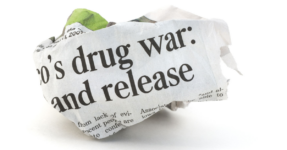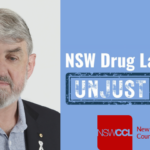Moving Away from War Against Drugs Brings Enormous Benefits

The global failure of the decades-long war on drugs has resulted in a myriad of issues for jurisdictions that continue to plough resources into enforcement and retain a model which sees addiction as a criminal law problem rather than a health issue – from spending large sums of money on policing, court time and imprisonment, to increased violent crime associated with the black market drug trade, to endangering the lives of users through enabling the supply of unregulated substances, to stigmatiing and alienating users and thereby dissuading them from seeking treatment, to the associated health costs including transmission of communicable diseases such as HIV.
Jurisdictions that have moved towards a regulated market have, on the other hand, invariably seen enormous economic, social and health benefits – both for individuals and communities, all the while not seeing an increase in the use of previously criminalised substances.
Australia: Drug Arrests and Overdoses
In Australia, drug offences are the second most frequently prosecute criminal offence category, with 15% of offenders having a principal offence that was illicit drug-related. And the worst part? The number of drug-related arrests and the number of people who are dying from overdoses or drug-related illnesses is not decreasing.
Australia: Economic Costs
Each year, Australia expends a significant portion of taxpayers’ money on prosecuting individuals for drug use, possession, or sale of illegal substances.
This financial investment in the criminal aspect of drug use is a clear misallocation of resources, neglecting the more crucial areas of harm reduction programs, treatment centres, therapy, and safe use practices.
It is evident that Australia’s current approach to the War on Drugs has not yielded the desired results. The country must transition from a punitive stance to a more rehabilitative one. Only by prioritising treatment, prevention, and education alongside fair law enforcement legislation can Australia hope to make significant strides in this area.
So, what can the country do? One of the best ways to change the way the government and policymakers think about drug use and its stigma is to focus on decriminalisation. Not only does decriminalisation work, but it has a proven track record in countries worldwide, offering a beacon of hope for Australia’s drug policy reform.
Countries with Successful Decriminalisation Legislation
Although Australia has not yet taken the path towards decriminalisation, it has a few countries with specific frameworks it can follow, offering a wealth of inspiration and potential for positive change.
United States
The United States turned its focus away from punishing drug use to a focus on rehabilitation and mental health, as studies had shown that there was a disproportionately high number of people of colour and low socioeconomic groups at risk of problematic use and drug-related incidents.
Since then, the US has seen numerous benefits of drug decriminalisation, including:
- Reducing the number of arrests,
- Reducing criminal justice costs,
- Reducing the number of people incarcerated, and
- Increasing the number of people entering drug rehabilitation and treatment centres.
Not all states have adopted the same legislation, but 24 states and Washington, D.C., have reduced criminal penalties for cannabis possession. Furthermore, 14 states and Washington D.C. consider possession a misdemeanour crime. Studies have shown that this is successful—U.S. jurisdictions with reduced penalties have lower rates of illicit drug use.
Forty states and the District of Columbia follow the 911 Good Samaritan Immunity Laws, decriminalising possession and minor offences in the case of an overdose.
In addition, numerous government organisations in the country, including the World Health Organization, American Public Health Association, Organization of American States, Human Rights Watch, and the NAACP, support decriminalisation, providing a strong foundation for its implementation.
The United States is moving towards a decriminalisation law for the entire country — but in the meantime, when certain states will not adopt a more ‘lenient’ law, the Drug Policy Alliance suggest that states should at least reclassify possession of illicit drugs as a misdemeanour to prevent a felony conviction.
Portugal
Another country that has succeeded in decriminalising drugs is Portugal. Portuguese legislators created a new decriminalisation model in 2001 (Portuguese Drug Policy Model) that allowed for a comprehensive decriminalisation of possession and consumption of all illicit drugs. Instead of considering these as criminal offences, Portugal considered possession and consumption as administrative misdemeanours, not crimes.
In addition to decriminalisation, Portugal increased its mental health, harm reduction, and addiction treatment centres across the country, including public access to medication-assisted treatments and sterile syringes.
Overall, Portugal and the PDPM are firm in their belief that the War on Drugs has failed in the world. Therefore, they have promised to fight for human rights and encourage lesser drug penalties in the upcoming global trends.
Czech Republic
Instead of recent changes in response to higher drug use rates, the Czech Republic has always incorporated mental health, harm reduction, and treatment aspects into its drug policies. Czechia offers syringe access programs, substitution treatment alternatives, and other support options for residents in the country.
During the 1990s, the Czech government imposed a criminal penalty on possession. The findings indicated that the harsher laws had no effect on drug use or harm, leading to an ‘unjustifiable’ law. Less than 20 years later, the Czech Republic decided to formally adopt a decriminalisation law with flexible threshold limits and a wealth of social benefits.
The Czech Republic created a new Criminal Code in 2009 to repeal the Criminal Law of 1961. The new code cites a punishment of 6 months to 5 years in prison for the production or distribution of drugs and possession in larger quantities. On the other hand, possession in small quantities is considered a misdemeanour subject to a monetary fine.
Furthermore, the Czech Republic created the Addiction Policy Action Plan 2023-2025 to improve:
- Addiction prevention and treatment,
- Regulating the market,
- Taxation on addictive products,
- Adhering to the Czech Presidency of the EU Council, and
- Minimising the Ukraine war’s influence on the Czech Republic’s addiction situation.
Switzerland
Switzerland is another nation that has adopted a decriminalisation practice that some may find unusual, but the country claims it has worked in societal interactions and crime rates. Switzerland has completely decriminalised substance use, provides 24/7 access to healthy-use programs, and offers pharmaceutical-based heroin as an in-clinic option.
But, this didn’t happen overnight. In the 1980s, Switzerland had more than 30,000 residents addicted to opioids, with HIV/AIDS, hepatitis C, and overdoses running rampant.
Switzerland then introduced the Four-Pillar Policy and revised the Narcotics Act 2008, focusing on harm reduction, repression, prevention, and therapy. In addition, the National Strategy on Addiction 2017-2024 identifies the causes of addiction and provides support for those with addiction.
The Netherlands
The Netherlands is tolerant to the sale and possession of ‘soft’ drugs in certain conditions, such as cannabis being sold in ‘coffee shops’. Although the sale of soft drugs is considered a criminal offence, the Public Prosecution Service does not prosecute the coffee shops. Furthermore, the Public Prosecution Service does not penalise the public for having 5 grams or less of cannabis or five or fewer cannabis plants.
The purpose of classifying ‘soft’ and ‘hard’ drugs in the Netherlands is to separate cannabis (marijuana) from hard drugs, with cannabis more tolerable and socially acceptable than other substances. The Netherlands altered the Opium Act of 1976 to allow for a social integration of illegal drugs, a reduction of possession penalties, and an increase in penalties for trafficking hard drugs.
Positive Outcomes from Decriminalisation Jurisdictions
Jurisdictions that have moved towards a regulated market and focused on rehabilitation over punishment have seen enormous economic, social, and health benefits in their societies.
United States
Studies have shown that decriminalisation led to numerous benefits for the justice system and society in one of the most lenient states in the United States — Oregon. Oregon had 67% fewer drug possession arrests after decriminalisation. Another study by the NYU Grossman School of Medicine found that decriminalisation policies in both Oregon and Washington had no relation to fatal drug overdose rates.
Portugal
Since its inception over 20 years ago, Portugal has had no increase in drug use — but it has seen a decrease in adolescent drug use, HIV/AIDS, drug-induced casualties, and arrest rates. Plus, Portugal has seen a significant rise in drug treatments accessed by the public between 1999 and 2003, increasing by an incredible 147%.
Czech Republic
Studies have shown that since 2019, the number of individuals prosecuted, accused, and convicted of illicit drug crime has decreased. The number of people accused of drug-related crimes hit an all-time high in 2015 at 3,174 and decreased to 2,829 in 2020. Plus, the United Nations Office on Drugs and Crime can utilise the public budget to be redirected to help with treatment programs. There are also fewer overcrowding issues and organised crime groups.
The Netherlands
Decriminalisation in the Netherlands has led to fewer overdose deaths, citing just 250 deaths in 2016. Plus, decriminalising heroin allows addicted individuals to be treated as patients, rehabilitated, and reintegrated into society.
Switzerland
From a financial standpoint, the focus on treatment over punishment has led to huge savings. The cost for a six-month methadone treatment is less than $2,000 compared to more than $20,000 for incarceration. Other constructive outcomes from the societal-wide shift to focusing on rehabilitation include fewer overdose deaths, less crime, and less spread of contagious diseases like HIV and hepatitis C.
Does Australia Have a Chance?
So, will Australia ever consider moving towards country-wide legislation that leads to decriminalisation, or will it be subjected to slow, state-by-state changes that could take too long?
Currently, only the Northern Territory and South Australia have the legal decriminalisation of cannabis in law (de jure). The Australian Capital Territory has decriminalised cannabis use and possession in specific conditions.
In practice (de facto), all Australian states have varying degrees of decriminalisation—but to different effects. The difference between de facto and de jure means an individual’s punishment varies based on the specific police officer’s discretion regarding eligibility criteria.
However, with vastly different laws on a case-by-case basis and state-by-state changes, it can take time to implement effective, country-wide changes focusing on reform.
One beacon of hope for NSW and the country as a whole is individual organisations that understand the need to push for decriminalisation and rehabilitation instead of punishment. Uniting Medically Supervised Injecting Centre Kings Cross has launched Fair Treatment, a drug decriminalisation program in NSW that has garnered the support of more than 70 organisations in the state, including the NSW Council for Civil Liberties.
Other organisations, like Harm Reduction Australia, have created needle and syringe exchange programs, supervised injecting rooms, and civil advocacy actions throughout the 1980s and 1990s to destigmatize drug use.
Despite the individualised programs that have had success in increasing community safety and widespread support, there are still federal and state-level issues that need to be fixed for Australia to move towards a safer country.
Overall, Australia will have to focus on a comprehensive change in the way the country as a whole views drug use, criminalisation, rehabilitation, and treatment to see widespread change in drug-related crime, illness, and economic implications.






